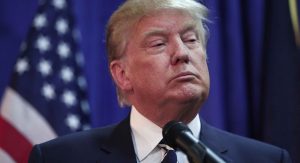 President Donald Trump has announced that the United States will withdraw from the Iran nuclear agreement reached by the Obama Administration in 2015. During a speech at the White House, Trump said that “the Iran deal is defective at its core” because the agreement does not block Iran from developing nuclear weapons. Trump noted that he pledged to end the agreement during his presidential campaign, and, “when I make promises, I keep them.”
President Donald Trump has announced that the United States will withdraw from the Iran nuclear agreement reached by the Obama Administration in 2015. During a speech at the White House, Trump said that “the Iran deal is defective at its core” because the agreement does not block Iran from developing nuclear weapons. Trump noted that he pledged to end the agreement during his presidential campaign, and, “when I make promises, I keep them.”
In previous months, Trump has refused to re-certify the Iran agreement, saying that Iran has not lived up to its part of the deal. He has cited claims by Israeli Prime Minister Benjamin Netanyahu that Iran has cheated on the development of nuclear weapons. However, the documents Netanyahu cited were created before the agreement went into effect.
In his statement, Trump also said that the U.S. would re-impose sanctions on Tehran. Trump did not specify the timeline for re-imposition of sanctions, but aides said there would be a wind-down period of up to 180 days. The decision could trigger renewed U.S. sanctions on Iran’s oil sales and Central Bank, potentially disrupting the country’s global financial transactions. There was a July deadline for a waiver on sanctions targeting Iranian businesses and individuals.
Trump and aides spoke by phone with congressional and foreign leaders about the agreement before his speech. Trump had said he wanted to give international partners and lawmakers a chance to improve the deal. House Speaker Paul Ryan (R-Wisc.) said he would preferred to “fix the deficiencies in the agreement,” and “it is unfortunate that we could not reach an understanding with our European partners on a way to do that.”
French President Emmanuel Macron, German Chancellor Angela Merkel and British Prime Minister Theresa May issued a joint statement expressing “regret and concern” over the decision and said they would try to maintain the agreement with or without the United States. The European leaders asked Trump and the United States “to avoid taking action which obstructs its full implementation by all other parties to the deal.”
Iranian President Hassan Rouhani said that his government remains committed to a nuclear deal with world powers. Iranian diplomats have been directed to negotiate with the deal’s remaining signatories, including European countries, Russia and China. Iran’s president also said there is only a “short time” for re-negotiations, as his country is ready to resume uranium enrichment.
